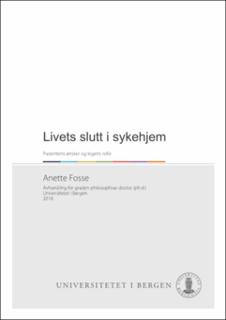Livets slutt i sykehjem. Pasientens ønsker og legens rolle
Doctoral thesis

Åpne
Permanent lenke
https://hdl.handle.net/1956/17874Utgivelsesdato
2018-06-14Metadata
Vis full innførselSamlinger
Sammendrag
In Norway, nearly fifty percent of all deaths occur in nursing homes. The last period of life in other high-income countries is also increasingly spent in nursing homes. The nursing home doctor is responsible for medical care in the last phase of life. Together with nursing personnel, the nursing home doctor is expected to preserve patients’ dignity as they approach death. To achieve this the doctor needs to know something about what patients and their relatives need and expect, medical education must furnish doctors with the skills and tools to meet these expectations, and organisation of nursing home services must facilitate a dignity conserving care. In this dissertation I have explored conditions for doctors’ delivery of dignity conserving care to nursing home patients in the last period of life. My analysis is funded on three studies about the following topics: 1) What does previous research tell about patients’ and relatives’ expectations and experiences on how nursing home doctors can contribute to high quality end-of-life-care in nursing homes? 2) What are the learning experiences with end-of-life care in nursing homes for newly qualified doctors, especially concerning dialogues about death? and 3) Nursing home doctors’ perspectives on barriers and strategies for providing end-of-life care in nursing home in Norway and in the Netherlands. The first study was a metasynthesis of 14 qualitative studies about nursing home patients’ and relatives’ expectations and experiences with end-of-life care, with special focus on their perception of nursing home doctors’ work. We used the seven steps procedure for metaethnography from Noblit and Hare in our analysis. In the second study we used material from three focus group interviews with 16 newly qualified doctors serving as house officers in nursing homes in Northern Norway, exploring their learning experiences with end-of-life care in nursing home with special focus on dialogues about death. Analysis was performed with systematic text condensation, supported by Lave and Wenger’s theory about situated learning and legitimate peripheral participation. The third study was a survey among 435 Norwegian and 244 Dutch nursing home doctors on barriers and strategies for end-of-life care. We used SPSS for analysis, and differences between countries were compared using chi-square-test and t-test. The metasynthesis revealed that patients and their relatives expect nursing home personnel to anticipate illness trajectories and recognize their needs for palliation and information. Worries about staff shortage and competence was common, and they expected the doctor to be available and participating. Patients’ ability to consent was often not recognized by family and health personnel. In the focus group study we found that newly qualified doctors discovered new aspects of their role as a doctor when attending dying patients as part of the interdisciplinary team in the nursing home. They experienced how challenging dialogues and medical decisions could become less difficult through personal knowledge of patients’ life story. The survey showed more similarities than differences between Norwegian and Dutch nursing home doctors in spite of educational and organizational differences. Most prominent barriers reported were inadequate staffing, lack of skills among personnel and heavy time commitment for nursing home doctors. Preferred strategies for enhancing endof- life care were routines for involving family, monitoring protocols for pain and symptoms, routines for advance care planning and better education of doctors and nursing personnel. This dissertation points to how doctors can avoid violation of patients’ dignity through dialogues about end-of-life focusing on the patients’ perspective more than on procedures. Having the courage to become involved with the patient as a person in combination with the ability to sound appraisal of medical, ethical and resource conditions, the doctor can adjust medical care to the individual patient. Time, competence and interest are key elements in improving end-of-life care in nursing homes. Medical education should emphasize reflection on death and dying in order to make doctors capable of enduring existential and medical dilemmas in the last phase of life. Nursing homes are interdisciplinary, practice based learning arenas offering expanded insight into doctors’ role in end-of-life care. In this dissertation I have explored nursing home doctors’ role, but my analysis is applicable to all doctors’ relation to death and dying and performance in end-of-life care.
Består av
Paper I: Fosse A, Schaufel MA, Ruths S, Malterud K. End-of-life expectations and experiences among nursing home patients and their relatives – A synthesis of qualitative studies. Patient Educ Couns. 2014 Oct;97(1):3-9. The article is available in the main thesis. The article is also available at: http://dx.doi.org/10.1016/j.pec.2014.05.025Paper II: Fosse A, Ruths S, Malterud K, Schaufel MA. Doctors’ learning experiences in end-of-life care – a focus group study from nursing homes. BMC Med Educ. 2017 Jan 31;17(1):27. The article is available at: http://hdl.handle.net/1956/17873
Paper III: Fosse A, Zuidema S, Boersma F, Malterud K, Schaufel MA, Ruths S. Nursing home physicians’ assessments of barriers and strategies for endof- life care in Norway and the Netherlands J Am Med Dir Assoc 2017;18:713-718. The article is available in the main thesis. The article is also available at: https://doi.org/10.1016/j.jamda.2017.03.005